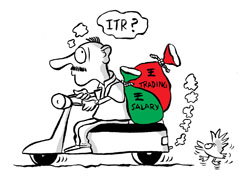Ramalingam Kalirajan |10899 Answers |Ask -Follow
Mutual Funds, Financial Planning Expert - Answered on May 29, 2024
He has an MBA in finance from the University of Madras and is a certified financial planner.
He is the director and chief financial planner at Holistic Investment, a Chennai-based firm that offers financial planning and wealth management advice.... more

Sir, I will be 80 years of age on 07 Feb, 2024. I have made some Long Term Capital Gains from Mutual Funds during this current financial year, 2023 - 24. I understand that senior citizens aged 80 years and above need not file any income tax returns. Please let me know whether I should pay the long term capital gains tax for this current financial year or need not.
Congratulations on your upcoming milestone of turning 80 on 07 February 2024. It's a significant achievement and I appreciate the wisdom that comes with it. Let's discuss the tax implications for your long-term capital gains from mutual funds in the current financial year, 2023-24.
Income Tax Rules for Senior Citizens
In India, senior citizens (aged 60 and above) and super senior citizens (aged 80 and above) enjoy certain tax benefits. These include higher exemption limits and additional deductions. For super senior citizens, the income tax exemption limit is higher compared to regular taxpayers.
Long Term Capital Gains (LTCG) Tax
Long-term capital gains (LTCG) from equity mutual funds are taxed at 10% if the gains exceed Rs 1 lakh in a financial year. This tax is applicable irrespective of your age or income bracket.
Filing Income Tax Returns
Super senior citizens, aged 80 years and above, are generally not required to file income tax returns if their income is below the exemption limit. However, this exemption does not apply to taxable long-term capital gains.
Need to Pay LTCG Tax
Even though you will be 80 years old, you need to pay long-term capital gains tax if your gains exceed Rs 1 lakh. The exemption from filing returns based on age does not exclude you from paying taxes on capital gains.
Importance of Compliance
It's important to comply with tax laws to avoid any penalties or legal issues. Paying your LTCG tax ensures that you stay within the legal framework.
Role of Actively Managed Funds
Actively managed funds have the potential to provide higher returns, which could lead to higher long-term capital gains. This makes it crucial to plan your tax liabilities accordingly.
Benefits of Regular Plans
Investing through regular plans with the guidance of a Certified Financial Planner ensures that you receive expert advice. This can help you manage your investments and tax liabilities effectively.
Avoiding Real Estate and Index Funds
Real estate investments and index funds are not recommended in this context. Actively managed funds provide better management and potential returns, which align with your financial goals.
Professional Advice
Consulting with a Certified Financial Planner can help you navigate the complexities of tax laws. They can provide personalized advice based on your financial situation.
Importance of Planning
Effective financial planning includes managing your tax liabilities. By understanding the tax implications of your investments, you can make informed decisions.
Regular Review
Regularly reviewing your investment portfolio ensures that it aligns with your financial goals and tax planning needs. A Certified Financial Planner can assist in this process.
Conclusion
Even at 80 years of age, paying long-term capital gains tax is necessary if your gains exceed Rs 1 lakh. Compliance with tax laws is crucial for financial health. Consulting with a Certified Financial Planner can help you manage your investments and tax liabilities effectively.
Best Regards,
K. Ramalingam, MBA, CFP,
Chief Financial Planner,
www.holisticinvestment.in
Here's the key point:
You are eligible for the super senior citizen tax exemption with a limit of Rs. 5 lakh for the financial year 2023-24.
Now, let's consider two scenarios:
Scenario 1: Total LTCG is less than Rs. 2.5 lakh AND total income (including LTCG) is less than Rs. 5 lakh
In this case, you don't need to pay any tax and don't need to file an income tax return. The LTCG itself is below the Rs. 1 lakh taxable threshold, and your total income falls within the super senior citizen exemption limit.
Scenario 2: Total LTCG is more than Rs. 2.5 lakh OR total income (including LTCG) is more than Rs. 5 lakh
Here, things change. You'll need to pay LTCG tax on the amount exceeding Rs. 1 lakh (the remaining Rs. 1.5 lakh in case your total LTCG is Rs. 2.5 lakh). Additionally, if your total income (including LTCG and other income sources like pension or interest) surpasses Rs. 5 lakh, you might need to file an income tax return.
Recommendation:
To determine your exact tax liability, it's advisable to calculate your total income for the financial year 2023-24. This includes your LTCG, pension income (if any), and any other taxable income sources.
If it falls under the Rs. 5 lakh limit, you're good to go.
If it exceeds Rs. 5 lakh, consult a tax advisor to understand your filing requirements and LTCG tax implications.
Remember, this is a simplified explanation. Tax laws can be intricate, so consulting a professional for personalized advice is always recommended, especially if your situation involves a high LTCG amount or complex income sources.
Best Regards,
K. Ramalingam, MBA, CFP,
Chief Financial Planner,
www.holisticinvestment.in
Best Regards,
K. Ramalingam, MBA, CFP,
Chief Financial Planner,
www.holisticinvestment.in
You may like to see similar questions and answers below
T S Khurana |536 Answers |Ask -Follow
Tax Expert - Answered on Feb 19, 2025
Vivek Lala |323 Answers |Ask -Follow
Tax, MF Expert - Answered on Jun 04, 2025
Reetika Sharma |425 Answers |Ask -Follow
Financial Planner, MF and Insurance Expert - Answered on Oct 11, 2025
Ramalingam Kalirajan |10899 Answers |Ask -Follow
Mutual Funds, Financial Planning Expert - Answered on Dec 17, 2025
Ramalingam Kalirajan |10899 Answers |Ask -Follow
Mutual Funds, Financial Planning Expert - Answered on Dec 17, 2025
Ramalingam Kalirajan |10899 Answers |Ask -Follow
Mutual Funds, Financial Planning Expert - Answered on Dec 17, 2025
Ramalingam Kalirajan |10899 Answers |Ask -Follow
Mutual Funds, Financial Planning Expert - Answered on Dec 17, 2025
Ramalingam Kalirajan |10899 Answers |Ask -Follow
Mutual Funds, Financial Planning Expert - Answered on Dec 17, 2025
Mayank Chandel |2576 Answers |Ask -Follow
IIT-JEE, NEET-UG, SAT, CLAT, CA, CS Exam Expert - Answered on Dec 17, 2025
Radheshyam Zanwar |6747 Answers |Ask -Follow
MHT-CET, IIT-JEE, NEET-UG Expert - Answered on Dec 16, 2025
Shalini Singh |181 Answers |Ask -Follow
Dating Coach - Answered on Dec 16, 2025
Patrick Dsouza |1429 Answers |Ask -Follow
CAT, XAT, CMAT, CET Expert - Answered on Dec 16, 2025
Nayagam P P |10858 Answers |Ask -Follow
Career Counsellor - Answered on Dec 16, 2025





























